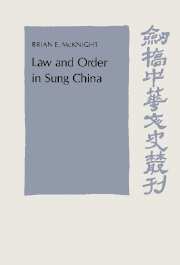Book contents
- Frontmatter
- Contents
- List of figures, maps, and tables
- Preface
- List of abbreviations
- 1 Introduction
- 2 The historical context
- 3 Crimes and criminals
- 4 Informal and semiformal agencies of law enforcement
- 5 Formal civil agencies of law enforcement
- 6 The role of the military in law enforcement
- 7 Supervision of law enforcement – the role of the intendants
- 8 Personnel selection
- 9 Urban crime and urban security
- 10 The Sung penal system
- 11 Jails and jailers in the Sung
- 12 Penal registration
- 13 The death penalty
- 14 Modifications of penalties
- 15 Conclusion
- Glossary
- Bibliography
- Index
6 - The role of the military in law enforcement
Published online by Cambridge University Press: 23 December 2009
- Frontmatter
- Contents
- List of figures, maps, and tables
- Preface
- List of abbreviations
- 1 Introduction
- 2 The historical context
- 3 Crimes and criminals
- 4 Informal and semiformal agencies of law enforcement
- 5 Formal civil agencies of law enforcement
- 6 The role of the military in law enforcement
- 7 Supervision of law enforcement – the role of the intendants
- 8 Personnel selection
- 9 Urban crime and urban security
- 10 The Sung penal system
- 11 Jails and jailers in the Sung
- 12 Penal registration
- 13 The death penalty
- 14 Modifications of penalties
- 15 Conclusion
- Glossary
- Bibliography
- Index
Summary
Introduction – wen versus wu
“The military and punishment are a single Way.” With this simple declaration a Sung official put the Chinese assessment of the role of the military in law enforcement in cameo. Since one facet of law enforcement is bringing to bear force sufficient to deter or suppress lawbreaking, the military clearly must play an irreplaceable role in dealing with disorders too large in scale to be dealt with by the regular police system. Although many modern states are almost always able to handle disorder without calling on the military, the use of military force always remains as a last resort. What was characteristic in the use of the military by many traditional Chinese dynasties, of which the Sung is a good example, was the integration of the military into the ordinary institutions of law enforcement. The military and punishments were seen as a single way in that they both embodied the sovereign's forceful responses to those who would disturb the social order. The distinction between police and the military (which the Chinese did recognize) was rooted in differences in the scope of the threat, not in differences in the type of threat.
The role of the military in law enforcement was especially delicate in the Sung. Early Sung analysts, who sought ways of reducing this power, traced the social and political problems of the late T'ang and the Five Dynasties to the delegation of excessive power to the military. This reaction against excessive militarism was part of an overall pattern. In the second century B.C. the great Han historian Ssu-ma Ch'ien had searched for patterns in the Chinese past.
- Type
- Chapter
- Information
- Law and Order in Sung China , pp. 191 - 227Publisher: Cambridge University PressPrint publication year: 1992



